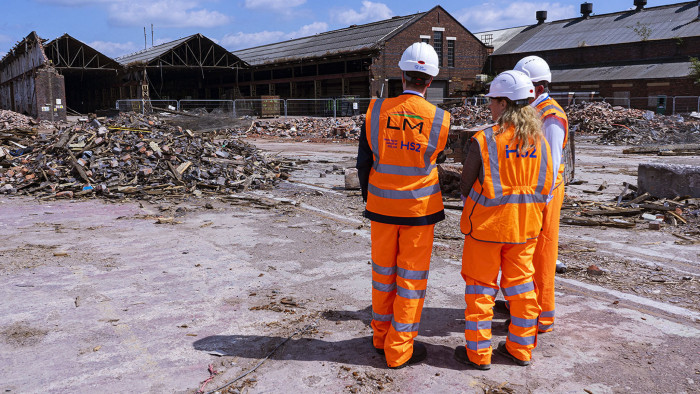In Birmingham, HS2 offers hope coming down the tracks
Roula Khalaf, Editor of the FT, selects her favourite stories in this weekly newsletter.

Washwood Heath, part of the urban sprawl of Birmingham in the English Midlands, is a bleak monument to the UK’s industrial prime. There is little left. But once it was home to van maker LDV and train builders Metro-Cammell, both of which closed in the noughties. The neighbourhood is the city’s third most deprived area, sitting in the bottom 5 per cent nationally.
But hope may be coming down the tracks. The old sheds are being ripped down for the country’s most ambitious infrastructure project in a century: the High Speed 2 railway. After its first phase is complete, Birmingham will be a mere 49-minute journey from London. By phase two, travel times northwards to Manchester will be halved and an hour shaved off the hop from here to Leeds.
The project is about to hit the point of no return. Some £5bn has been sunk into the scheme, but one of the first decisions for the UK’s next prime minister is whether to keep or scrap HS2, which would throw all of Britain’s rail future in doubt. Prime Minister Theresa May is in favour of the project; as is Tory party leadership contender Jeremy Hunt. Only Boris Johnson, his rival, is unsure, egged on by his party’s retrograde fringe.
Here’s the case against. HS2 is undeniably expensive: £56bn to build a lot of untested tech on a small, densely-populated island. Few railway experts think it can be delivered on time and on budget. It bypasses smaller towns in desperate need of better transport and will carve up more of England’s green spaces. Management mishaps have been a feature.
The most potent argument is that the cash could be better spent on links between provincial towns. This is where the scrappers miss the point: HS2 is not about fast, flashy trains, but simple capacity. The railways are more popular than ever, but they are choked up. The West Coast mainline, which HS2 will mirror, is Europe’s most congested route. When HS2 is finished, 35,000 seats will be available every hour out of the capital — triple the current level. The project will free up the existing lines for more services to other towns.
Andrew Adonis devised the plan as Labour transport secretary. If HS2 is scrapped, he warns, money will not magically appear elsewhere. “Instead, we will have to upgrade the existing Victorian railway lines between London, Birmingham, Manchester and Leeds to meet a growing transport capacity crisis.” Such improvements would be just as costly but deliver far fewer gains, he argues.
For its supporters, HS2 is more than a railway: it’s a question of what kind of country the UK wants to be. Are we serious about rebalancing the north-south divide with better infrastructure? Will we forge new industries in the “left-behind” areas that voted heavily to leave the EU?
Washwood Heath is one such area already benefiting. After 15 years of scant opportunities, 500 high-quality jobs will be created when the train depot and control centre rises from the wasteland here. Hundreds of other building sites nationwide are similar hives of activity, providing 9,000 jobs. When the construction hits its stride, 30,000 people will be employed — including 2,000 apprentices.
HS2 is an important test, too, for the Conservatives. Yes, conserving what is of value is part of the party’s purpose, but not thwarting progress based on trusting gut instinct over evidence. Andy Street, the Tory mayor of the West Midlands, understands this. The new railway is central to his vision for revitalising this swath of England.
“It was HS2 coming that gave us the growth deal to invest as heavily as we are now doing,” he says. This is how Mr Street persuaded HSBC to build its new UK headquarters in Birmingham.
He reckons it is “unthinkable” that the next leader would kill off HS2, because it speaks to core Tory values. “I cannot understand how a party that talks about productivity and economic opportunities is possibly going to turn its back on something that is an enabler of all of that.” The mayors of every major northern city agree with him, as do 113 business leaders who see it as vital for growth.
Mr Johnson has pledged an evidence-based review into HS2. The facts are clear. But if the incoming PM needs any more proof, he should pop along to Washwood Heath to witness how HS2 is already helping the parts of Britain that need it the most.
This article has been updated to clarify that Metro-Cammell was closed in the noughties
Comments